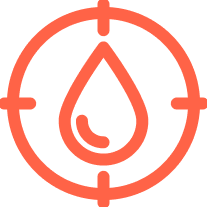Schedule a consultation with our NHS-trained specialists to receive a personalised treatment plan that fits your lifestyle.


Breathe easier, live better.

Already have test results?
Skip the guesswork! Share your existing allergy test results, and we’ll craft a personalised treatment plan tailored to your needs.
Who we help
Personalised solutions for every allergy journey
We’re here to support you, no matter where you are in your allergy journey. Whether you're seeking a diagnosis, looking for advanced treatments, or managing ongoing symptoms, we design treatments to meet your needs.

Suffering from respiratory or environmental allergies?
If dust mites, tree pollen, or grass pollen trigger your symptoms, our natural advanced treatments help build your immune system’s tolerance, providing long-term relief.

Never been tested?
Start with our easy-to-use At-Home Allergy Test Kit. Discover your triggers with lab-verified results and expert analysis.

Are you a candidate for immune training therapy?
Sublingual immunotherapy is designed for individuals with moderate-to-severe environmental allergies who haven’t found relief through traditional medications. It works by addressing the root cause of your allergies for long-term symptom control.
Our treatments
Comprehensive allergy relief tailored to you
We offer a range of treatments designed to address your unique needs, providing both short-term relief and long-term solutions.

Allergy desensitisation
from £99 / month
Long-term allergy relief for common triggers like pollen and dust mites, in convenient, daily tablets delivered to your door.
-
Helps reduce symptoms from grass pollen, birch pollen, and dust mites
-
Builds tolerance by training your immune system over time
-
Clinically proven, prescription-based treatment
-
Ideal for hay fever, dust allergies, and cross-reactive food triggers

Nasal sprays & antihistamines
£5 - 45
Fast, flexible allergy relief options to help you manage everyday symptoms during allergy season.
-
Quick relief from sneezing, congestion, and itchy eyes
-
Available as over-the-counter or prescription options
-
Can be used alone or combined with long-term treatments
-
Supports symptom control while waiting for desensitisation to take effect
-
Pricing varies based on prescription and product type

Understanding Your Allergy Triggers
Your allergy solution begins with identifying what triggers your symptoms
Understanding what triggers your allergy symptoms is the first step toward effective relief. Common allergens like grass, tree pollen, and dust mites can cause sneezing, congestion, and itchy eyes, but everyone’s triggers are unique. That’s why we offer comprehensive testing options to pinpoint your specific allergens and create a treatment plan tailored to your needs.
How the process works

Assessment and testing
Start with the Allergy Assessment: Answer a short online questionnaire to identify symptoms and understand your health history.
Follow up with testing: Use our allergy blood test kit for precise allergy diagnosis and personalised treatment planning.

Personalised consultation
Schedule a call with our specialist to review your history, test results, and treatment options. If sublingual immunotherapy (SLIT) is recommended, you’ll take your first dose under medical supervision to ensure safety and proper administration. Other treatments, like antihistamines or nasal sprays, may also be prescribed as part of your care plan.

Ongoing support and monitoring
Begin allergy desensitisation therapy at home with detailed instructions and support. Receive regular follow-ups to track progress, adjust treatment if needed, and ensure the best outcomes.

What makes AllergyRhino different?

Comprehensive care
From testing to treatment, all your needs are covered.

Convenience
At-home testing, medication delivery, and seamless booking options.

Expert guidance
NHS-trained specialists and proven treatments.

Evidence-based care
Clinically proven treatments ensure safe, effective, and lasting allergy relief.

Affordability
Transparent pricing and a price freeze guarantee for three years.
About our test kits
Our Spot Blood Test Kits make allergy testing simple and convenient, without the need for clinic visits.

Delivered to your door
Test on your schedule.

Easy-to-use
Clear instructions for quick sample collection.

Lab-verified results
Reliable analysis by certified labs and expert allergists.

Comprehensive testing
Identify common hay fever triggers like pollen and dust mites.

Progress tracking & support
Stay on course for lasting relief

Ongoing support and monitoring
We track your symptom improvements throughout the treatment, ensuring the plan evolves with your needs.

Personalised follow-ups
Based on your progress, we provide custom advice, modify treatment plans, or recommend additional support as needed.
Frequency
Scheduled follow-ups every 3-6 months.

Expert updates
Receive educational updates on managing allergies, including seasonal tips, the latest research, and personalised recommendations.
-
What is hayfever and what causes it?Hayfever is an allergic reaction to pollen. When tiny particles of pollen come into contact with the immune cells that line the mouth, nose, eyes and throat, triggering an allergic reaction. This means that the body overreacts to something that it perceives to be a threat – in this instance pollen, which is mistaken for an infection. The immune system wrongly releases chemicals designed to limit the spread of infection and, in doing so, sets off symptoms like itching, swelling, watery eyes and a runny nose.
-
What are the symptoms of hayfever?Symptoms, ranging from mild to extreme, include itchy eyes, sore throats, runny noses and sneezing and can have a significant impact on the patient’s quality of life. In children, this can affect concentration at school and exam performance, while adult sufferers often feel less focused, are less productive and also experience sleep difficulties. Reactions to grass pollen can, in some instances, also trigger asthmatic episodes.
-
Is there anything else my symptoms could be caused by?The first possibility is that allergic rhinitis could be caused by allergies other than grass pollen. This is particularly likely if symptoms are experienced all-year round or at other times of the year besides late spring to late summer. It is therefore vital that the symptoms are carefully assessed, a detailed personal history is taken and allergy testing is carried out. While the majority of hayfever sufferers are sensitive to grass pollen, some instead react to pollen from trees. It is therefore vital that the allergen culprit is correctly identified. If the allergy is not to grass pollen, treatment with grass pollen immunotherapy such as GRAZAX would not be effective and the cost of the treatment would be wasted. If the symptoms are more persistent and not just confined to the warmer months, symptoms could be caused by something else like dust or animal fur. A small minority of people experience symptoms that cannot be explained by allergies – this is known as non-allergic rhinitis. An important part of the evaluation process will be to confirm that symptoms are indeed caused by an allergen and that sublingual immunotherapy would therefore be a suitable treatment. Professor Stephen Till says: “when we assess a patient at Smart Allergy Solutions, we will seek to confirm the most appropriate treatment, including whether sublingual immunotherapy is a suitable option.”
-
When is the grass pollen hayfever season?It begins in May and runs through to August, with the season generally peaking between mid-June and mid-July.
-
What are the benefits of sublingual immunotherapy?Most patients receiving sublingual immunotherapy report an improvement in symptoms and less use of traditional treatments, such as antihistamines and steroid nasal sprays. In addition, using sublingual immunotherapy from an early age may actually prevent new allergies developing and also reduce the likelihood of getting asthma – which is eight times more likely in children who suffer from hayfever.
-
How do I know if sublingual immunotherapy will be suitable for me?One of our team of specialist allergists will take a medical history and perform a skin prick test in order to confirm that you are allergic to grass pollen. Sublingual immunotherapy is generally recommended where symptoms are not adequately controlled by standard medications and affects quality of life and functioning (such as social activities, work or sleep). If you suffer from asthma, the doctor will also confirm that it is well controlled enough for you to receive the treatment.
-
How do I use sublingual immunotherapy?Sublingual immunotherapy comes in dissolvable tablet or liquid forms manufactured by different companies. The tablet form is used at Smart Allergy Solutions because this is the only kind that is fully approved by the Medicines and Healthcare products Regulatory Agency in the UK. The tablet is placed under the tongue where it dissolves within 10-20 seconds. The first dose will be given under close supervision and the immunotherapy is then taken daily.
-
Will my hayfever be instantly cured?The benefits of taking sublingual immunotherapy will only be apparent once the allergen season begins. Symptoms should be milder during the first season. If sublingual immunotherapy is initiated, you will be advised to still continue other hayfever medications (see below: ‘What are the alternatives?’), although research suggests immunotherapy patients need and use these medications less.
-
How long will the treatment last?Usually, your treatment will ideally start at least three months before the normal onset of symptoms and continue all year round for three years. Improvements in symptoms would be expected from the first year of treatment, but research suggests that this benefit will continue for some years beyond the end of the course.
-
Does treatment exist for other forms of hayfever and allergy?A number of manufacturers supply sublingual immunotherapy vaccines for grass pollen and other allergies. The Medicines and Healthcare products Regulatory Agency has provided authorisation for grass pollen, tree pollen and house dust sublingual immunotherapy vaccines. Treatments are on offer for other allergens (such as cat and dog) but they are not licensed in the UK. They may be available on a named patient basis if there is a clinical need. If you think this may benefit you, please contact us at info@allergyrhino.com
-
Is sublingual immunotherapy safe?Sublingual immunotherapy frequently causes mild itching and swelling in the mouth a few minutes after it is taken, but this usually stops occurring within a few weeks of the course. Antihistamines can be taken beforehand during this period. Occasionally some patients develop abdominal pain and diarrhoea. Knowledge of the safety of this treatment is based on multiple studies from around the world. Most patients tolerate sublingual immunotherapy well and severe reactions are uncommon. Studies from Europe report that side effects are seldom troublesome enough for the patient to stop the treatment.
-
Is sublingual immunotherapy available for free on the NHS?There is very limited access to sublingual immunotherapy on the NHS at present. If you wish to be considered for option please discuss this with your NHS GP or specialist.
-
What are the alternatives?Standard allergy medicines suppress the symptoms, such as anti-histamines and steroid based medicines, such as nasal sprays are helpful treatments that will provide relief for many patients. For those with more troublesome hay fever, using these medications remains advisable but often will only provide partial relief from symptoms. These treatments also only work when they are taken and do not reduce the long-term severity of the underlying allergy. Slow release steroid injections are strongly advised against by allergy specialists due to the risk of long term side effects. Immunotherapy is the only treatment which affects the underlying cause of an allergy. Where immunotherapy is recommended, this is additional to standard hay fever medications although clinical trials show that immunotherapy patients need less of these medications over time.
-
What are the side effects?Like all medicines, sublingual immunotherapy can potentially cause side effects. In the early stages of treatment it is common to experience mouth itching and an irritating sensation in the throat within a few minutes of taking the dose. This is a mild allergic reaction and in most cases settles down within 20 minutes of starting treatment. Simple over-the-counter antihistamines, such as cetirizine or loratidine, can help alleviate symptoms and can be taken before the immunotherapy dose to reduce the risk of side effects if preferred. Other common side effects (which may affect up to one in 10 people) include: headache, prickling sensation or numbness of the skin, mouth or tongue, eye or ear itching, eye, nose or mouth inflammation, asthma symptoms, shortness of breath, cough or sneezing, dry throat, nasal discomfort, stuffy or runny nose, swelling of lips or tongue, stomach pain or discomfort, mouth blistering, heartburn, itching, tiredness, fever and chest discomfort. These generally occur in the first week of taking the medication and tend to be mild to moderate and short-lived. Stop taking sublingual immunotherapy immediately and consult a doctor if you experience any of the following: Rapid swelling of face, mouth or throat Difficulties in swallowing Difficulties in breathing Hives Voice changes Worsening of existing asthma Severe discomfort
-
What options and steps are included in a long-term allergy treatment plan?If both you and the doctor agree that treatment is required, various treatments will be offered to you depending on the history and severity of your allergy which may include; antihistamines, nasal sprays, and sublingual immunotherapy. You will be counselled on how to use each one of your treatments effectively, if immunotherapy is an appropriate treatment, you will then be given the first dose during the appointment under the doctor’s supervision to ensure it is taken correctly. Detailed instructions on continuing with the three-year course will be provided. Following your appointment, you will be required to pay a one-off fee for the first three months’ supply of the medication. We will then take monthly payments and supply the medication, through a GPhC accredited pharmacy, on a quarterly basis to you until the end of the course (36 months). For immunotherapy, once the first dose is administered in the surgery, you will be required to continue each day at home. This simple process involves putting the sublingual immunotherapy tablet under the tongue to dissolve. Regular use increases the tolerance of the immune system towards pollen and the treatment recommendation for this is 3 years. The three-year course can commence at any time but depending on the allergen this is most effective when started at least three months before the appropriate pollen season. Once the patient commits to the course and pays for the first six months of treatment, Allergy Rhino will guarantee a price freeze for three years. You will receive a monthly email from Allergy Rhino, as well as a web-based questionnaire to complete at the end of each hay fever season. Allergy Rhino will automatically inform your GP of the initial results and about the course of treatment.
-
What if I need to speak to someone at AllergyRhino?In the majority of cases, we find that our system of email contact (info@allergyrhino.com) works well and you can also use our contact form on our website to get in touch. You can also call our doctor at 0207 362 1023 if you have any questions.
-
Who is our partner pharmacy?Chemist Click is our partner pharmacy Contact details: T: 01923549040 A: Cardinal Point, Park Road, Rickmansworth, WD3 1RE W: www.chemistclick.co.uk



